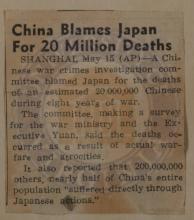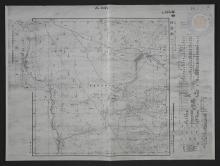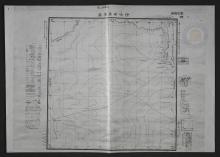Manchurian War Blamed on Army News Article
Description:
Reports on the testimony given by Ken Inukai (son of the late premier Tsuyoshi Inukai) and Baron Reijiro Wataksuki, both of whom testified that "extremist elements in the Japanese army planned and carried out the conquest of Manchuria in complete defiance of the wishes of Emperor Hirohito and the civilian governments in power at the time." They discussed Araki and Minami as well as the aggressive actions that occurred in China.







